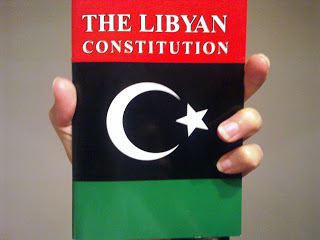By Nihal Zaroug.

Tripoli, 22 November:
During Wednesday’s meeting of the National Congress, members addressed suggestions on the formation of the constitutional drafting . . .[restrict]committee, which has been critiqued as long-overdue. The GNC’s principal task is the establishment of a 60-member committee that will draft Libya’s new constitution, which will ultimately be voted on via national referendum.
The original constitutional declaration of August 2011, produced by the National Transitional Council (NTC), states that the drafting committee is to be selected by the GNC. 60 experts are to be chosen to form the committee, split 20-20-20 for each of Libya’s three main regions; east, west and south. This would ensure equal regional input, especially when defining vital articles such as Libya’s national identity, form of government, and the separation of religion and state.
However, prior to Libya’s national elections, the NTC amended the constitutional declaration to include that the drafting committee be elected rather than appointed. The GNC has the authority to overturn NTC rulings, but it has not yet done so as Congress is divided on its course of action. The last minute change has made the GNC’s job even more difficult, as it now must agree on a mechanism to select the drafting committee, whether it be through appointment or election.
According to reports, the GNC has a set of propositions it must decide on prior to setting up the drafting committee. The GNC is seeking input from experts on which criteria to use to appoint members, and in the case of holding elections for the committee, an election design is required.
During a GNC press conference, spokesman Omar Hmaidan articulated the need for dialogue with civil society, listening to the views of the Libyan people, involvement of jurists and politicians, active use of seminars, discussions, forums, and the necessity of technical recommendations to define a clear mechanism for the constitution-building process.
Among the GNC’s main considerations is the role of civil society and the public in the selection of the committee and the drafting process itself. If Libyans are to eventually vote for their constitution, they must be able to make an informed decision, and this can only be achieved by engaging the nation in an open debate on what a constitution entails. Particularly, concepts such as “will of the majority” and human rights must be explained. Congress has suggested using media and the Internet to spread the constitutional culture to the public.
The issue of timing has not been addressed with a revision, although it is said that the timeline is too short. Risks of oversimplifying key issues may force the drafting committee to focus on areas they deem important instead of developing the constitution as a whole. The short timeframe diminishes prospects for public participation and proper deliberation on major issues such as federalism and secularism.
For women’s rights the constitution is an important tool in safeguarding freedoms and gaining new rights, for example equal ownership rights, educational rights, marital rights and passing of citizenship to children. Likewise for minority groups, the constitution can protect their cultural diversity and officiate their languages. For such groups in particular, a well-written constitution can protect them against the state. When the state fails to uphold rights and settlement required by a court, it would be difficult for the judiciary to deny rights enshrined in the constitution.
The Legislative Committee, headed by Omar Abulifa, is reportedly steering in the direction of holding elections to form the drafting committee, however a final decision on the matter has not been taken. Earlier this week, independent congressman from Benghazi, Ahmed Langi, told Libya Herald, that the majority of Congress favoured overturning the NTC amendment and most supported choosing committee members rather than holding elections.
Although it is believed that the GNC will likely reverse the NTC ruling, it is often forgotten why the NTC hastily changed the selection method. Disputes over the division of seats in the GNC, threats of boycotting the national elections by the east and closure of the Wadi Al-Ahmar (boundary between east and west Libya) by protesters, forced the NTC to make the change for the ‘’sake of national unity’’. With a new government in power, preserving unity will allow the authorities to focus on vital issues of security, defense, healthcare, economy and reconciliation. [/restrict]






